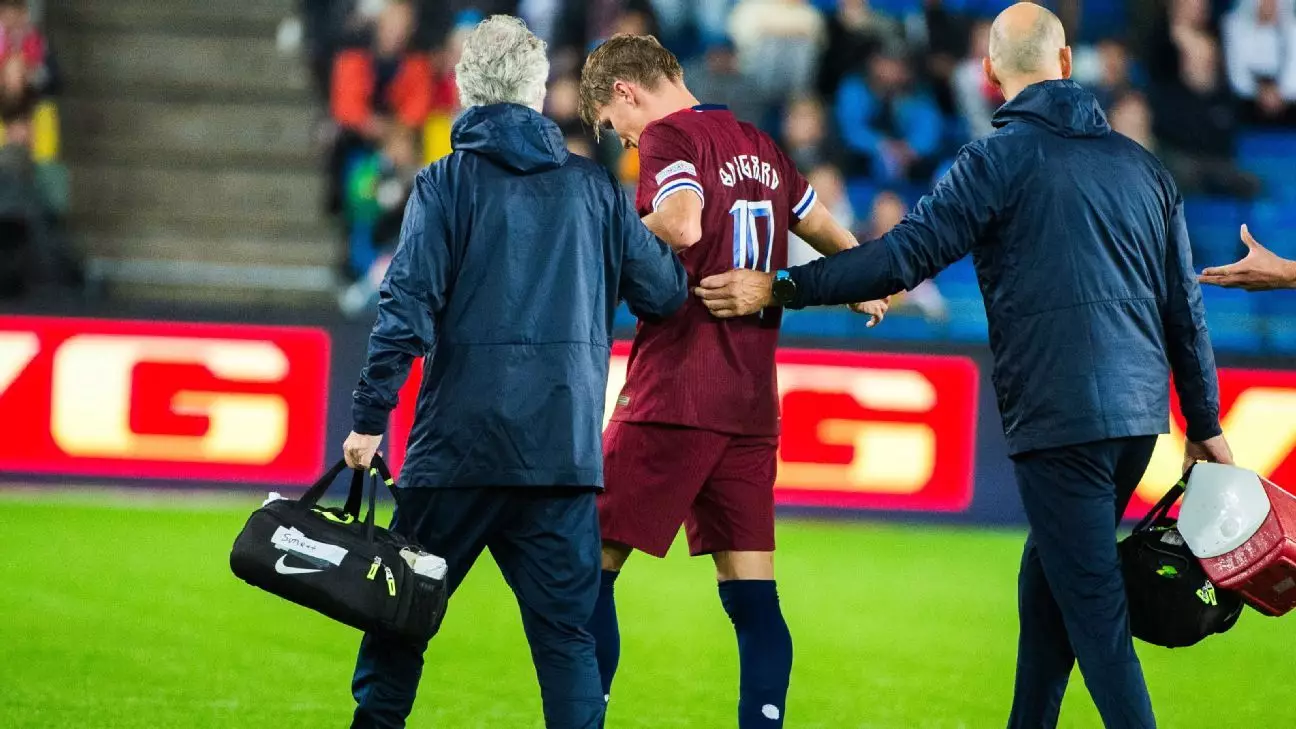The world of professional football is a relentless one, where players are often heralded for their resilience and dedication. However, the arduous nature of the sport can lead to injuries that challenge even the greatest athletes. This is the situation facing Arsenal midfielder Martin Ødegaard, who recently found himself sidelined following an ankle injury incurred during a national team match on September 9. After rigorous rehabilitation, Ødegaard made a tentative return to action, yet the Norwegian Football Federation—including their medical staff—has deemed it wise for the player to skip two crucial Nations League matches against Slovenia and Kazakhstan to focus on his recovery.
Ødegaard’s situation epitomizes the challenges faced by athletes when trying to mesh the demands of international duty with club responsibilities. After making a brief comeback in Arsenal’s 1-0 loss against Inter Milan, the 25-year-old featured again in a 1-1 draw against Chelsea. Even during these limited appearances, it was clear that he has not yet regained full match fitness. “I’ve been through a long training period, and when you haven’t practiced football in the last nine weeks, it’s natural not to be 100% yet,” Ødegaard candidly explained in a recent statement. This self-awareness signifies a mature approach, recognizing the importance of a gradual return to full form rather than rushing back into action, which can heighten the risk of re-injury.
Medical Insights and Strategic Decisions
Norwegian team doctor Ola Sand provided a more in-depth perspective on Ødegaard’s condition, describing the injury as “complicated.” Such descriptors underscore the nuanced nature of ankle injuries—elements that require careful management to prevent setbacks. Sand emphasized the significance of allowing adequate time for rehabilitation, stating that the midfielder is not yet in the optimal physical condition necessary for national team duties. This highlights a critical consideration in professional sports: the interplay between individual player needs and team objectives. Decisions made in favor of a player’s health might sacrifice short-term results but can ultimately benefit the player and team in the long run.
Ødegaard’s absence from the pitch has certainly raised questions regarding both his club and country. Arsenal has been relatively successful in his absence, winning three out of their first four Premier League encounters without him. However, the losses against Bournemouth and Newcastle were stark reminders of how critical Ødegaard is to Mikel Arteta’s side. His vision, creativity, and tactical awareness have been sorely missed during these key fixtures. This lack of presence likely contributed to Arsenal’s regression in league standing, leaving them nine points behind leaders Liverpool after a promising start to the season.
On a national level, not being able to contribute against Slovenia and Kazakhstan may weigh heavily on Ødegaard’s shoulders. Despite expressing solidarity and support for his teammates, it is understandable that he would be disappointed. He mentioned, “It’s a bad feeling to lose these games; I love playing for Norway.” Such sentiments reveal the emotional connection players have with their national teams and the pride associated with representing their country.
As Norway gears up for their Nations League matches without their captain, Ødegaard will return to London to continue his rehabilitation. The necessity of prioritizing his health over immediate participation cannot be overlooked, as the long-term benefits of a full recovery could greatly enhance both his club and international contributions in future fixtures.
His situation encapsulates the balancing act that modern-day athletes must perform—an obligation to their clubs, a commitment to national glory, and, most importantly, the duty to maintain their health and vitality. If Ødegaard can successfully navigate this period of recovery, he will likely return stronger, poised to lead both Arsenal and Norway in their forthcoming challenges, ultimately shaping the trajectories of both teams as the season progresses.
